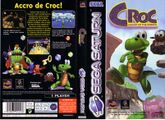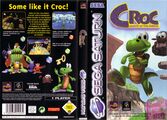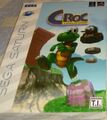Croc: Legend of the Gobbos
From Sega Retro
| Croc: Legend of the Gobbos | |||||||||||||||||||||||||||||||||||||||||||||
|---|---|---|---|---|---|---|---|---|---|---|---|---|---|---|---|---|---|---|---|---|---|---|---|---|---|---|---|---|---|---|---|---|---|---|---|---|---|---|---|---|---|---|---|---|---|
| System(s): Sega Saturn | |||||||||||||||||||||||||||||||||||||||||||||
| Publisher: Fox Interactive (US), Electronic Arts (EU), Media Quest (JP) | |||||||||||||||||||||||||||||||||||||||||||||
| Developer: Argonaut Software | |||||||||||||||||||||||||||||||||||||||||||||
| Sound driver: SCSP/CD-DA (35 tracks) | |||||||||||||||||||||||||||||||||||||||||||||
| Peripherals supported: 3D Control Pad | |||||||||||||||||||||||||||||||||||||||||||||
| Genre: Action | |||||||||||||||||||||||||||||||||||||||||||||
| Number of players: 1 | |||||||||||||||||||||||||||||||||||||||||||||
| |||||||||||||||||||||||||||||||||||||||||||||
Croc: Legend of the Gobbos, known as Croc! Pau-Pau Island (クロック!パウパウアイランド) in Japan, is a 3D platform game developed by Argonaut Software for the Sega Saturn, Sony PlayStation and Microsoft Windows. A 2D version exists for the Game Boy Color.
Contents
Story
Croc: Legend of the Gobbos stars the young crocodile, Croc, who is found drifting down a river in a basket by a tribe of small brown furry creatures called Gobbos. Adopted and raised by them, Croc quickly shoots up in size and begins to feel isolated from his adoptive family.
The peace of the land is broken when the evil Baron Dante and his army of Dantinis invade the Gobbo's home island, capturing all of them and spreading them all over the chain of islands on the archipelago, with the Gobbo leader King Rufus encaged in the Baron's castle. Croc, who was spirited away by a bird called Beany at the last minute by the King before his capture, must now travel the island chain with Beany and rescue all the captured Gobbos, defeat the Baron and save the King from his prison.
Gameplay
As a 3D platform game, Croc sees the player traverse over 3D levels, collecting crystals, defeating enemies, and exploring in an attempt to free all of the captured Gobbos that Baron Dante has spread around the various islands of the game world. Each level usually has six Gobbos, usually hidden in crates or locked inside cages, with the sixth one usually placed in the sealed off bonus section towards the end of the map.
Similar to Sonic the Hedgehog, crystals act as hit points - as long as Croc is carrying a crystal, he cannot be killed, but coming into contact with enemies or dangerous obstacles will cause Croc to drop his crystals. Coloured "bonus crystals" are also scattered around the levels, which may also be locked up or inside crates, or disguised as normal crystals. If each of the five bonus crystals are collected (one each of red, green, blue, yellow and purple), the bonus section becomes available.
Croc has the ability to strike back at enemies with two different attacks - a tail swipe, or a stomp (performed by jumping in the air then pressing another button to drop down heavily on the target). The latter move is also used to open crates, while the former is used to strike the "Beany Gong", used to to summon Beany and complete each level. Enemies that are defeated don't stay gone for long, however - they will respawn within a fairly short time, making the aim of the game more about saving Croc's friends than killing every enemy in sight.
Levels
The game world of Croc is broken up into five distinct islands:
- Croc saturn eu world1.png
World 1: The home Gobbo island. Grassy levels, with lava.
- Croc saturn eu world2.png
World 2: A snowy island, with icy cold water.
- Croc saturn eu world3.png
World 3: A desert island.
- Croc saturn eu world4.png
World 4: The Baron's castle island.
- Croc saturn eu world5.png
World 5: A mysterious crystal island.
Each of the first four islands has the same structure - three regular levels, each with six Gobbos to find, then a mid-world boss. Finding all the Gobbos in the three regular levels will open up a secret level, usually on a miniature island away from the main one (though not always - in world 4 one of the secret levels is in the dungeon of Dante's castle). The pattern then continues in the second half of the world, with another three levels with six Gobbos to find, an end-world boss, and another secret level with a jigsaw piece.
Secret levels contain a hidden jigsaw piece which needs to be found, and once all eight jigsaw pieces are collected, a fifth and final island is unlocked, with four more levels on it. Each level is a more difficult example of each of the four previous world's levels (i.e. there is a grassy level, an ice level, a desert level and a castle level). Completing all of these (there are no Gobbos to be found here) will unlock the game's real final boss, which upon defeating shows the true ending.
The bosses themselves (with the exception of the final world 4 Boss and the world 5 boss) aren't actually Dantinis - for each, the Baron has transformed an innocent creature it into a vicious being with the objective of stopping Croc. Upon defeating each of these non-Dantini bosses, a cutscene is shown of the spell being dissipated and Croc helping the ex-boss back towards its friends before Beany spirits him up again and on to the next challenge - in this way, Croc is helping the non-Gobbo creatures the Baron has been terrorising too.
Level List
Just about every level and boss name in the game is a pun or reference in some form - the below table lists the levels and where known, what the pun/reference is.
| Level | Level name | Pun source |
|---|---|---|
| 1-1 | And So The Adventure Begins | |
| 1-2 | Underground Overground | The theme song from British TV series The Wombles |
| 1-3 | Shoutin Lava Lava Lava | Shouting lager lager lager, lyrics from the Underworld track "Born Slippy" |
| 1-B1 | Lair of the Feeble | |
| 1-S1 | The Curvy Caverns | |
| 1-4 | The Tumbling Dantini | |
| 1-5 | Cave Fear | The movie Cape Fear |
| 1-6 | Darkness Descends | The second album by the American thrash metal band Dark Angel. |
| 1-B2 | Fight Night With Flibby | |
| 1-S2 | The Twisty Tunnels | |
| 2-1 | The Ice of Life | The British idiom Variety is the spice of life |
| 2-2 | Be Wheely Careful | A pun of the general advice Be really careful - the level contains a large section with rotating cogs and a bottomless pit |
| 2-3 | Riot Brrrrr | Riot grrrl, an underground feminist punk rock movement |
| 2-B1 | Chumly's Snow Den | |
| 2-S1 | Clouds of Ice | |
| 2-4 | I Snow Him So Well | I Know Him So Well, a 1985 song performed by Elaine Paige and Barbara Dickson |
| 2-5 | Say No Snow | |
| 2-6 | License To Chill | License To Kill, James Bond's secret agent status |
| 2-B2 | Demon Itsy's Ice Palace | |
| 2-S2 | Ice Bridge To Eternity | |
| 3-1 | Lights Camel Action | Lights, camera, action, the Hollywood catchphrase |
| 3-2 | Mud Pit Mania | |
| 3-3 | Goin Underground | Likely the 1979 album from British punk rock band The Jam |
| 3-B1 | The Deadly Tank of Neptuna | Japanese anime The Deadly Tank, which had a character in it called Neptuna. |
| 3-S1 | Arabian Heights | The Arabian story collection of the Arabian Nights, also a song from Disney's Aladdin |
| 3-4 | Sand and Freedom | |
| 3-5 | Leap of Faith | The idiom Leap of faith, but also a reference to a platforming game trope where you cannot see where your character is jumping to |
| 3-6 | Life's a Beach | The saying Life's a bitch |
| 3-B2 | Cactus Jack's Ranch | Likely a reference to the 1979 western film The Villain, named Cactus Jack in the UK and Australia |
| 3-S2 | Defeato Burrito | |
| 4-1 | The Tower of Power | Likely a reference to the American soul and funk based horn section and band Tower of Power, who have been performing since the 70s |
| 4-2 | Hassle in the Castle | A Scooby-Doo cartoon film from 1969 |
| 4-3 | Dungeon of Defright | |
| 4-B1 | Fosley's Freaky Donut | |
| 4-S1 | Smash and See | |
| 4-4 | Ballistic Meg's Fairway | |
| 4-5 | Swipe Swiftly's Wicked Ride | |
| 4-6 | Panic at Platform Pete's Lair | |
| 4-B2 | Baron Dante's Funky Inferno | |
| 4-S2 | Jailhouse Croc | The Elvis Presley song Jailhouse Rock |
| 5-1 | And So The Adventure Returns | A pun on the name of level 1-1 |
| 5-2 | Diet Brrrrr | A pun on the name of level 2-3 |
| 5-3 | Trial on the Nile | |
| 5-4 | Crox Interactive | Fox Interactive, the game's publisher |
| 5-B | Secret Sentinel |
Saturn Rendering Bug
Due to programming errors caused by differences between the development and retail units, the original European and North American releases of the game had a bug where non-textured polygons are not displayed (notably including much of Croc including his head and some enemies). Faulty copies of the game were recalled in North America, but in Europe Electronic Arts included a yellow leaflet in subsequent copies of the game instructing the user on how to work around the bug. The workaround is to first switch the console on and then insert and load the game, rather than switching the console on with the game already inserted. This bug does not exist in any of the PlayStation or PC versions.
History
Sequels and re-releases
Croc was followed in 1999 by Croc 2 on the PlayStation, Game Boy Color and Windows. Ports for the Nintendo 64 and Sega Dreamcast were planned, but scrapped.
Promotional material
Physical scans
| Sega Retro Average | |||||||||||||||||||||||||||||||||||||||||||||||||||||||||||||||||||||||||||||||
|---|---|---|---|---|---|---|---|---|---|---|---|---|---|---|---|---|---|---|---|---|---|---|---|---|---|---|---|---|---|---|---|---|---|---|---|---|---|---|---|---|---|---|---|---|---|---|---|---|---|---|---|---|---|---|---|---|---|---|---|---|---|---|---|---|---|---|---|---|---|---|---|---|---|---|---|---|---|---|---|
|
| 76 | |
|---|---|
| Based on 15 reviews | |
| Saturn, UK |
|---|
|
References
- ↑ 1.0 1.1 File:CVG UK 191.pdf, page 49
- ↑ 2.0 2.1 File:SaturnPower UK 09.pdf, page 74 Cite error: Invalid
<ref>tag; name ":File:SaturnPower UK 09.pdf_p74" defined multiple times with different content - ↑ File:SSM_UK_26.pdf, page 62
- ↑ File:SSM_JP_19980410_1998-11.pdf, page 197
- ↑ CD Consoles, "Février 1998" (FR; 1998-xx-0x), page 142
- ↑ Electronic Gaming Monthly, "January 1998" (US; 199x-xx-xx), page 160
- ↑ Famitsu, "1998-04-03" (JP; 1998-03-20), page 1
- ↑ GamePro, "January 1998" (US; 199x-xx-xx), page 104
- ↑ Game Informer, "January 1998" (US; 199x-xx-xx), page 58
- ↑ Hobby Consolas, "Diciembre 1997" (ES; 1997-xx-xx), page 120
- ↑ MAN!AC, "03/98" (DE; 1998-02-11), page 67
- ↑ Mega Console, "Ottobre 1997" (IT; 1997-xx-xx), page 80
- ↑ Mega Force, "Novembre/Décembre 1997" (FR; 1997-1x-xx), page 54
- ↑ Saturn Fan, "1998 No. 6" (JP; 1998-03-13), page 154
- ↑ Saturn Fan, "1998 No. 10" (JP; 1998-05-15), page 116
- ↑ Sega Saturn Magazine, "December 1997" (UK; 1997-11-12), page 62
- ↑ Sega Saturn Magazine, "1998-11 (1998-04-10,17)" (JP; 1998-03-27), page 197
- ↑ Strana Igr, "Noyabr 1997" (RU; 1997-xx-xx), page 66
- Pages with broken file links
- Pages with reference errors
- 3D Control Pad-compatible games
- 1 player games
- JP Saturn games
- All JP games
- US Saturn games
- All US games
- EU Saturn games
- All EU games
- DE Saturn games
- All DE games
- ES Saturn games
- All ES games
- FR Saturn games
- All FR games
- UK Saturn games
- All UK games
- BR Saturn games
- All BR games
- Saturn games
- 1997 Saturn games
- All 1997 games
- Saturn action games
- All action games
- Old content rating field
- Use romtable template
- All games
- GalleryPrintAd file defined
- Old-style rating (cdconsoles)
- Rating without PDF source
- Old-style rating (famitsu)
- Old-style rating (maniac)
- Rating without source
- Old-style rating (saturnpower)
- Use magref
- Old-style rating (ssm)
- Old-style rating (ssmjp)
- Update ratings template
- 6 old ratings











